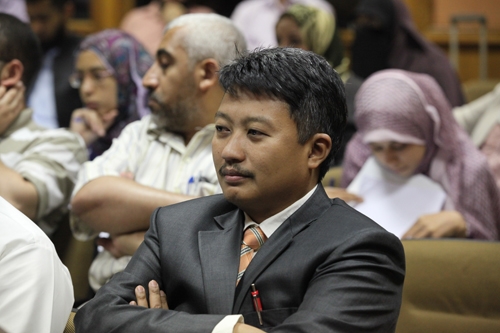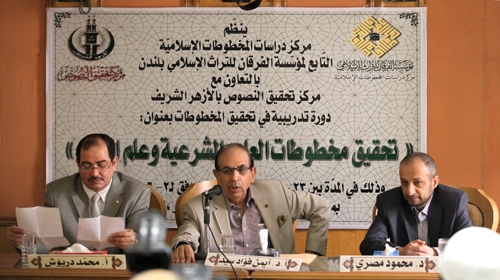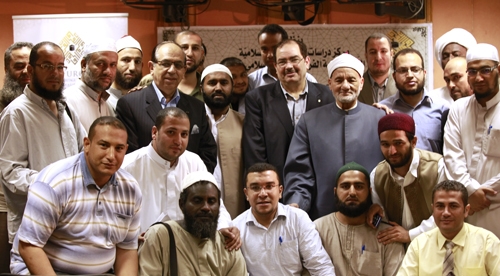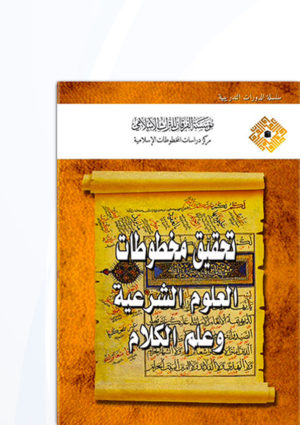The Centre for the Study of Islamic Manuscripts in co-operation with Markaz Tahqiq al-Nusus (the Centre for Critical Editions) at Al-Az’har organised the second joined training course on editing, under the title “Rules and Methods of Editing Manuscripts in the Field of Sharia’h Sciences and Theology”.
The course was held between the 2nd and 6th of June 2013, at Markaz Mu’tamarat Al-Az’har in Madinat al-Nasr, Cairo-Egypt.
The course encompassed all aspects of manuscript editing, its methodology, its processes and procedures. In addition the course covered principals of academic publishing for Islamic legal texts and theology.
The course was successfully delivered by a team of international specialists whose backgrounds covered a wide range of disciplines associated with the science of manuscript editing.Forty two participants from the academic community, manuscript authorisation research centres, libraries and postdoctoral candidates all took part in the training course. A number of the teaching faculty of Egyptian universities specialising in philosophy and the Islamic sciences also attended. The course participants came from a wide variety of countries, such as Egypt, Sudan, Indonesia, Libya, Algeria, Turkey, Syria, the United Kingdom, the Kingdom of Saudi Arabia and Pakistan.

The program was opened by Mr. Muhammad Drioueche, Head of the Foundation’s Projects and Publications Department. He thanked the co-operating partners and especially Dr. Ahmed al-Tayyeb, the Grand Imam of Al-Az’har, and Dr. Ayman Fuad Sayyid, Director of the Centre for Critical Editions. He also expressed his gratitude to the attending Faculty, the participants, university officials and guests. In his opening speech, he drew the audience’s attention to the importance of such courses and their aims and objectives. These he described as supporting participants in their professional development and creating a greater academic awareness of the field and its historical value. Particular attention would, as he described, be given to producing a new generation of specialist researchers in the science of manuscript editing, training them in the skills that will enable them to produce high class research in the field through a process of study and practical manuscript editing.
Prof. Dr Ayman Fuad Sayyid, Director of the Centre for Critical Editions, also expressed his view on the importance of such courses and praised the co-operation with Al-Furqān Foundation, hoping that such courses would become a yearly occurrence. He also said that the objective behind these courses was to prepare and bring to the fore a new highly trained generation of researchers, able to undertake a critique of historical texts. This comes, as he described, at a time when there is a dire need to close a generation gap between newcomers to the field and its predecessors - predecessors who have left a legacy in the Arabic library, having edited great classics, to include individuals such as Abdu-l-Salam Haroun, Mahmood Shaker, Ahmed Shaker, Mohammed Abu al-Fadhl Ibrahim, Fuad Sayyid, Mohammed Abdu-l-Khaliq Adhima, Mohammed Mustafa Ziyadah, and others from countries across the Arab world such as Mohammed Kurd Ali, Khalil Mardam, Mohammed Bahjat al-Athari, Mustafa Jawad, Mohammed bin Taweet al-Tanjee and others.
Closing such a gap, he continued, comes only through academic practice with a variety of texts. He then described Al-Az’har initiative to work to narrow this generation gap through an implementation of article six of the Statute for the Development of Al-Az’har. This took the form of setting up the Centre for Critical Editions and actively acquiring and publishing manuscript heritage. He also added that the University has also entered into an agreement with the Al-Furqān Foundation to run regular training courses on editing manuscripts.

This was followed by a presentation by Prof. Dr. Mahmood Masri, in which he highlighted that concern for the heritage, its study, and helping raise awareness of the discipline, was in essence an expression of concern for the collective history of a civilisation.
He also praised the Al-Furqān Foundation for organising these courses, encouraging students and researchers to push further their work in the field.
The course began looking at the concept and stages of editing and problematic issues surrounding the practice. It looked at laying down the principals for editing as set by Muslims, and focused on manuscripts relating to the Islamic sciences, including jurisprudence and its foundations, Ḥadīth, and also manuscripts on theology and philosophy. The session included workshops and practical sessions.
The last day witnessed an open floor discussion, where professors answered questions put to them by participants. The most prominent related to the mixed responses they had received from the professors on whether the practice and method of authorisation used was a specifically Muslim creation or one by orientalists.

Certificates were distributed and the evening was closed with a poem recital in praise of the Al-Furqān Foundation and its Chairman, His Excellency Sheikh Ahmed Zaki Yamani.


